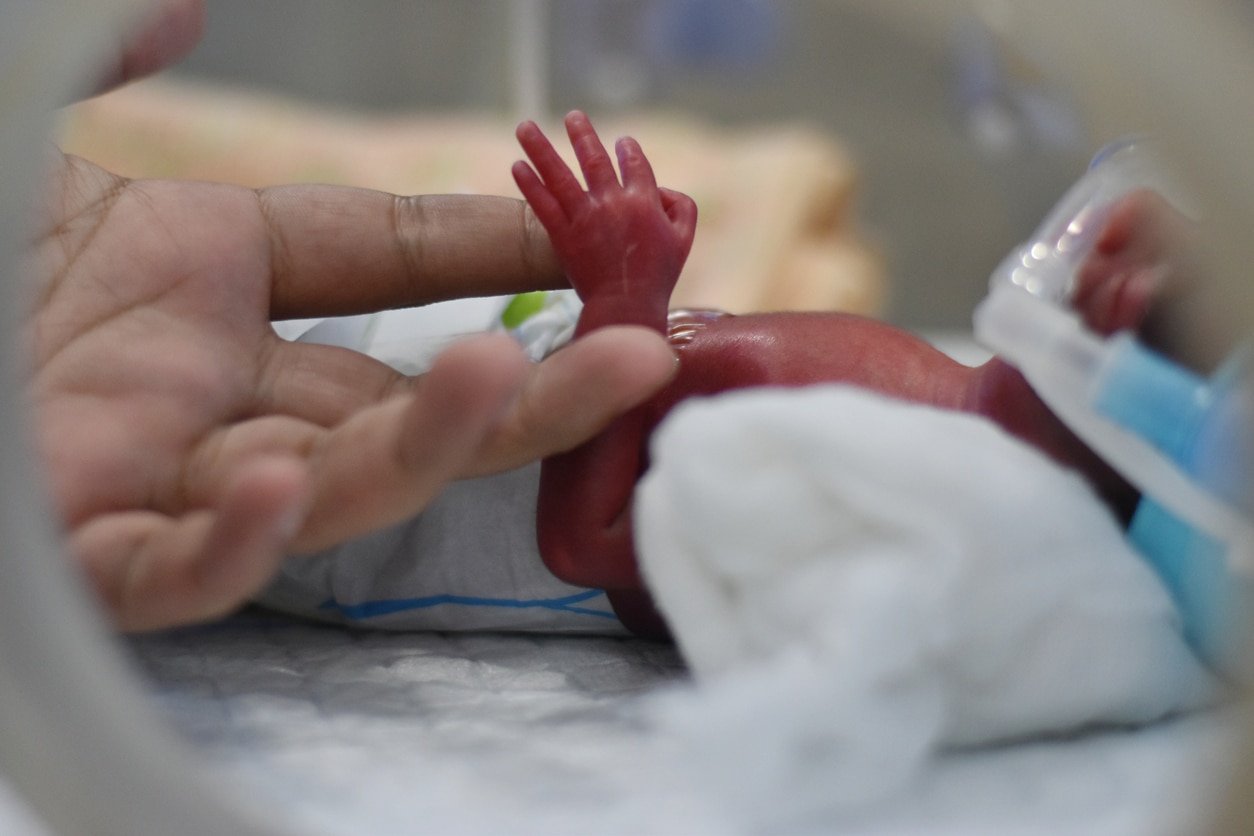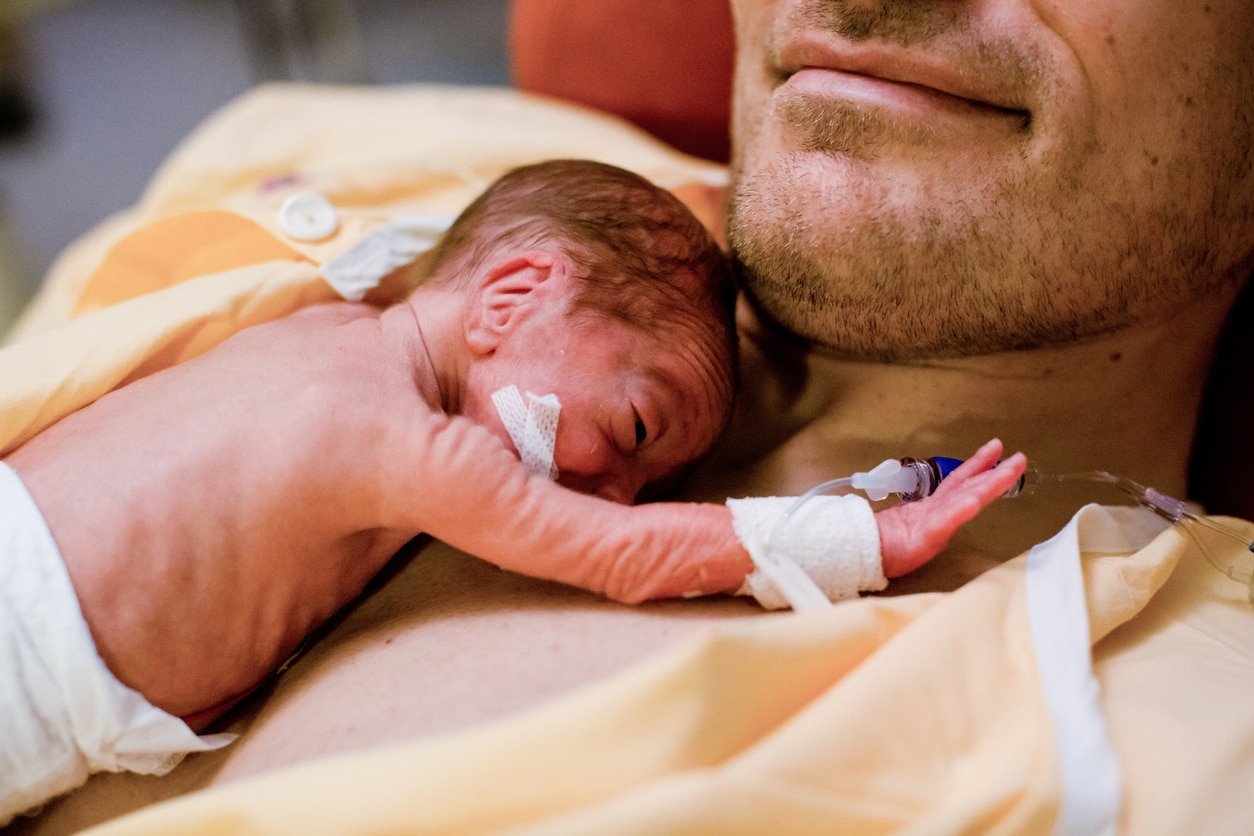
Giving birth to a premature baby can undoubtedly cause a significant change of plans for you and your family. The early arrival of your little one requires quite a bit of adjustment. If your bundle of joy has arrived earlier than anticipated, it is essential to have realistic expectations as your preemie grows, develops, and prepares for going home.
When Is a Baby Considered a Preemie?
If your baby is born before 37 weeks gestation, they are considered premature.1 Because your baby is growing and developing outside of the protective environment of the amniotic sac, they may need more support and medical care than babies born closer to their due date. There are different terms used to differentiate the degree of prematurity:5
- Late preterm infants are born between 34 and 36 weeks gestation.5 Most babies who are born early fall into this category.4
- Moderately preterm infants are born between 32 and 34 weeks gestation.
- Very preterm infants are born at less than 32 weeks gestation.
- Extremely preterm infants are born at or less than 25 weeks gestation.5
What Is a Micro Preemie?
Besides gestational age classifications, there are specific weight categories used to classify premature baby weight:17
- Low birth weight means a baby weighs less than 2,500 grams or 5 pounds, 8 ounces.
- Very low birth weight means a baby weighs less than 1,500 grams or 3 pounds 5 ounces.
- Extremely low birth weight means a baby weighs less than 1,000 grams or 2 pounds 3 ounces. These babies are also called micro preemies.6
Micro preemies are very fragile and are at the highest risk for complications.2

How To Calculate Adjusted Age
Adjusted age is calculated by subtracting the number of weeks your baby was born early from their actual age. If your baby is now 4 months old and was born two months (8 weeks) early, their adjusted age would be 2 months.8 If you compared a 4-month-old baby born at 40 weeks gestation to your preemie baby, you may see a difference in their developmental skills. For example, your baby may not be smiling to get your attention yet because this skill doesn’t typically occur until 4 months.12
When Do Preemies Catch Up?
All babies develop at their own pace; however, if your baby is a preemie, their adjusted age will give you a more realistic idea of when they may achieve certain developmental milestones for the first two years.9 During this time, most preemies experience catch-up growth.10 If your baby does not seem to be achieving certain milestones by age 2, their healthcare provider can refer them to specialists where they can receive additional support.9
Preemie Growth Chart
Growth charts are tools that healthcare providers use to assess trends in your baby’s weight, length, and head circumference over a period of time. This helps them detect any inconsistencies based on your child’s anticipated growth.18
The World Health Organization (WHO) growth chart is used for babies born at term, and the Fenton growth chart is used for preemies. Both include weight, length, and head circumference measurements, but the WHO growth chart measures in monthly increments, while the Fenton growth chart measures in weeks. The Fenton growth chart starts at 22 weeks and ends at 50 weeks. Once your baby reaches 40 weeks adjusted age, both charts can be used to track their growth. After your baby has graduated from the Fenton growth chart, their adjusted age should be used to plot their growth on the WHO growth chart until they are 2.10
Do Premature Babies Grow Slower?

Whether your preemie grows more slowly depends on the severity of medical complications they encounter. Being born early does not necessarily result in slower growth because your baby’s development continues as if it were a growing fetus. What can cause slower growth are health complications such as respiratory issues, challenges in gaining weight, and difficulties in learning to feed.11,14
Preemie Baby Development Week by Week
If your baby is born early, there are several preemie milestones to look for as they grow and develop.
26 Weeks
At 26 weeks, your baby may open their eyes periodically, but to reduce overstimulation, their environment will be darkened with an incubator cover as they sleep and grow.11 Nutrition and hydration are provided by IV fluids. A tiny IV (intravenous) tube is inserted into a vein in the best possible location for reliable and stable access. This may be on your baby’s hand, foot, scalp, or even through their umbilical cord stump. These IV fluids will support your preemie’s growth until the medical team has determined they are ready for full feedings.13
They will likely have apnea of prematurity, which means they pause between breaths because the part of their brain responsible for triggering breaths isn’t completely developed. As they get older, this will decrease, and your baby’s doctors will make sure they grow out of it before they go home. Your baby can hear your voice and sounds in their environment because their ears are fully formed. Their skin is not fully developed and is very fragile. The NICU staff will teach you how to touch your baby to avoid overstimulation.11
26-28 weeks
Your baby can blink, and their eyebrows and lashes start developing. You may even see them respond when they hear your voice during times of alertness. They are practicing sucking, but it will be a while before they can feed by mouth. This occurs when they can coordinate sucking, swallowing, and breathing.11 If the medical team determines they are ready, they will be fed through a nasogastric or orogastric tube inserted into their nose or mouth that goes down their esophagus and into their stomach.13 If your preemie is medically stable enough, you may be able to begin holding them on your chest skin-to-skin, also known as kangaroo care.11
28-30 Weeks
At 28-30 weeks, your baby’s muscle tone increases, and they move their arms and legs more frequently. They may also shut their eyes in response to bright light. Singing or talking to your baby during periods of alertness is a great way to bond, as your voice is familiar to them. The rooting reflex, which causes your baby to turn their mouth toward a pacifier or finger touching their cheek, may start developing. This reflex will help your baby find food sources when ready to breastfeed or bottle-feed.11
30-33 Weeks
Between 30-33 weeks, you may notice that your preemie’s movements are smoother as they get stronger. Their sleep patterns become more regular, alternating between deep sleep and alert periods. Your baby can also begin focusing on your face and responding more clearly to your voice. They also may start soothing themselves by bringing their hands together toward their mouth.11
33-36 Weeks
At 33-36 weeks, your baby develops clear activity states, such as deep sleep, active sleep, quiet alert, and active alert. Telling your baby what you are about to do can help them anticipate diaper changes.11 They may also be able to gradually be moved from the incubator to an open crib as long as they can maintain a normal body temperature. This ability depends on their weight and gestational age.15 Their coordination of sucking, swallowing, and breathing may be adequate for them to start feeding. Your baby’s medical team will determine if they are ready. Oral feeding is started gradually because it requires your baby to expend extra energy.14
37 Weeks+
Once your preemie reaches 37 weeks, taking them home may be on the horizon. For them to be completely ready, the medical team will ensure your NICU baby has met all their discharge goals. Depending on the facility, these may include completing tests such as a hearing exam and a car seat test. For this test, your baby will sit in their car seat while their vital signs are assessed to ensure they can tolerate sitting there for the ride home. Parent education, such as cardiopulmonary resuscitation (CPR) training, giving medications, or using home medical equipment if needed, is also provided.16
If your baby happens to arrive early, it is vital to know they may have some preemie-specific challenges to overcome. It may be tempting to compare your baby’s developmental achievements (such as rolling over, sitting up, crawling, etc.) to others of the same chronological age as they get older. But be realistic and keep their adjusted age in mind. Remember that each baby, born early or within days of their due date, is on a unique journey toward their developmental milestones. When your little one is ready, the celebration will be extra sweet!
from Baby Chick https://ift.tt/fhY1P5t
via IFTTT



0 Comments
Please ,
Don't enter span link ...